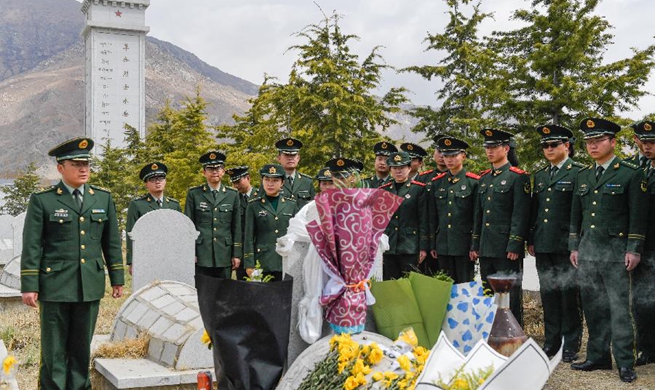WASHINGTON, April 5 (Xinhua) -- American researchers have remade the cancer's genetic landscape by reclassifying tumors into 28 different molecular "clusters," in a largest-ever cancer genomic investigation.
The study, published on Thursday in the journal Cell, revealed new possibilities for novel immune-based cancer therapeutics. It provided a push for clinicians to obtain and utilize comprehensive genomic information to enroll their patients into specialized "basket" or "umbrella" clinical trials.
"The Cancer Genome Atlas (TCGA)," funded by the National Institutes of Health, completed the genetic sequencing and analyses of about 10,000 tumors from patients spanning 33 types of cancer, and focused on identifying similarities between cancers based on changes in their genes, and the way their genes are expressed.
They used a technique called molecular clustering, which groups tumors by parameters such as genes being expressed, abnormality of chromosome numbers in tumor cells and DNA modifications.
Researchers discovered that some cancers grouped together based on the cell type from which the tumor came from. For example, squamous cell cancers from the head and neck, lung, and bladder, cervix, and esophagus had strong molecular similarities and grouped together.
"Studying their molecular features, we now know such cancers are closely related," said "Ding Li, an associate professor of medicine at Washington University and leading scientist of TCGA project. "Cancers originating in, for example, epithelial cells that line various organs are similarly closely related, regardless of their location."
They found that some types were defined by their anatomic location and other cancers from the same organ system, such as gastric, colon and rectal cancers, also shared molecular similarities. However, some organ sites had a broad diversity in molecular subtypes, such as the kidney.
Therefore, a drug that might have failed as a treatment for lung cancer might be re-examined as a potential therapy for, say, squamous cell carcinoma, again, regardless of location, according to Ding.
Altogether, the researchers identified about 300 genes that drive tumor growth and just over half of all tumors analyzed carry genetic mutations that could be targeted by therapies already approved for use in patients.
"This new molecular-based classification system should greatly help in the clinic, where it is already explaining some of the similar clinical behavior of what we thought were different tumor types," said Charles Perou, a professor of genetics, pathology and laboratory medicine at University of Carolina and a co-author of this paper.
Christopher Benz, an oncologist at the Buck Institute for Research on Aging said, new TCGA data hold particular promise for expanding treatments designed to enlist the immune system to beat cancer, including approved immunotherapies now showing extremely promising results against a limited number of classical cancer types.
"It's time to re-write the textbooks on cancer, and it's time to break down the silos in clinical oncology that make it difficult for patients to take advantage of this paradigm shift in cancer classification," said Benz.

















